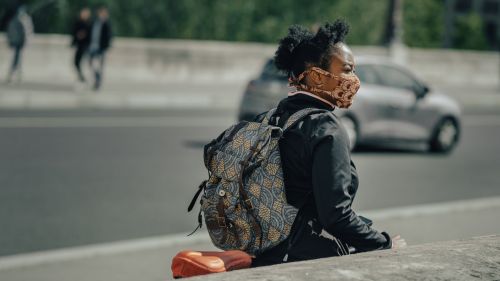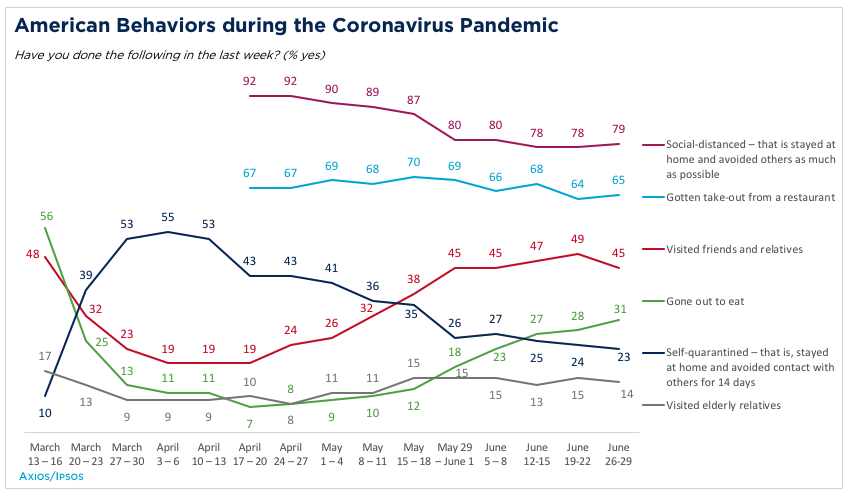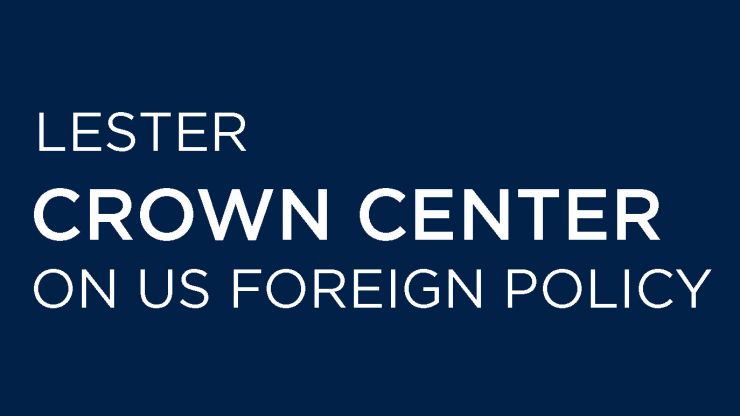Global Public Opinion as COVID-19 Second Wave Looms

This week the world passed the 11,836,900 million case mark, with over 544,231 deaths attributed to COVID-19.
This week the world passed the 11,836,900 million case mark, with over 544,231 deaths attributed to COVID-19. As nations attempt to return to normalcy, many remain concerned about the possibility of a second wave of infections as businesses and schools reopen. The United States is experiencing a second wave of infections in states originally less affected by the pandemic outbreak, forcing some states to halt or roll back plans to reopen businesses.
The Council survey team is providing updates every other week on public opinion around the world on the COVID-19 pandemic. This week, the Chicago Council Survey team’s update includes polling results from the United States, Japan, South Korea, Canada, France, Italy, the UK, Brazil, and Russia.
Key Findings
- While cases in France decline, many French people still feel pessimistic about their personal economic situation (55%) as well as the public health situation in France (64%). In Italy, too, a majority (70%) believe the economic situation will be worse in the fall.
- Although the rate of new infections is dropping in the United Kingdom, an outbreak in Leicester has lead the government to impose a localized lockdown, of which a strong majority of Britons approve. approve.
- Americans, facing a new wave of infections in many states, are nonetheless more likely to report going out from home than earlier in the pandemic. But when they do, the majority (53%) say they wear a mask at all times.
- In Japan, fears of a second wave of infections are widespread, with more than nine in ten Japanese saying they fear a resurgence of COVID-19. Perhaps for that reason, two-thirds (67%) say they do not plan to travel this summer. Most Canadians, too, think a second wave of infections is likely. To prevent it, the government has kept the US-Canada border shut, a stance supported by eight in ten Canadians (81%).
- Brazilian President Jair Bolsonaro, himself now sick with COVID-19, nevertheless vetoed additional restrictions aimed to prevent the spread of the disease. As cases in Brazil continue to rise, a majority of Brazilians (65%) say the situation is worsening in their country.
- As the number of cases continues to rise in Russia, nearly half of doctors believe that official statistics undercount the number of cases (49%) and deaths (47%).
United States
3,014,123 cases, 131,329 deaths
Polling from Axios/Ipsos, conducted in weekly waves from mid-March through the end of June, shows how Americans’ behaviors have changed over the course of the pandemic. The proportion of Americans who say they have practiced social distancing—that is, staying at home and avoiding others as much as possible—has declined somewhat over the past two months, from 92 percent in mid-April to 79 percent at the end of June. Fewer Americans also report self-quarantining: half of Americans in late March through mid-April reported doing so; by the end of June, this number stood at 23 percent. 23 percent.
With in-restaurant dining not always an option, take-out dining has remained popular, with two-thirds of Americans consistently reporting that they’ve gotten take-out in the last week. And with some states now re-opening restaurants to dining, more Americans are eating out again: three in ten (31%) said they had done this at the end of June, continuing a slow rise from a low of 7 percent in mid-April.
Americans are also socializing more. Visits to friends and relatives took a sharp dip early in the coronavirus outbreak, dropping from a weekly behavior for half of Americans down to 19 percent by April. But beginning in late April, the proportion of Americans reporting that they had visited friends and relatives began to increase. By the end of June, nearly half of Americans (45%) reported doing so, marking a return to the levels first seen in mid-March polls. However, only 14 percent of Americans reporting visiting their elderly relatives in the past week. This level has changed little over the course of the pandemic, though it is unclear whether this represents a normal level of interaction or whether these visits were one of the first activities to go when news of the pandemic began.

When Americans are going out, they are also more likely to be wearing the hottest fashion accessory of the year: a face mask. Half of Americans (53%) say they wear a mask at all times, with another 30 percent saying they wear one sometimes, but not all the time. Only seven percent say they never wear a mask when they go out. And the public generally favors mask requirements, despite the very loud protests in some states. A HuffPost/YouGov poll conducted June 17-19 finds that Americans favor government rules requiring masks in public (62% favor, 28% oppose) and favor stores requiring masks while shopping (69% favor, 24% oppose). Six in ten (62%) say wearing a mask is a matter of public health, not personal choice. And most Americans believe masks are protective: 44 percent say it protects the wearer and those around them; a quarter (27%) say it mostly protects people around the wearer, and ten percent believe it mostly protects the person wearing the mask. most Americans believe masks are protective: 44 percent say it protects the wearer and those around them; a quarter (27%) say it mostly protects people around the wearer, and ten percent believe it mostly protects the person wearing the mask.
Japan
20,870 cases, 987 deaths
The nationwide state of emergency in Japan has been over for more than a month, and the outbreak seems under control across the country. Only 1,519 cases were reported nation-wide over the past week. Still, cases continue to pop up in Tokyo, with more than a hundred new cases reported each day for the past five days. While this is far lower than many cities around the world, the continuing low-level outbreak in Tokyo raises fears of a second wave. Newly-reelected Tokyo governor Yuriko Koike has said that in her second term she will focus on preventing such a second wave and aims to establish Tokyo’s own center for disease control in order to improve the city’s response to the coronavirus.
Nationally, the public is split over the government’s response to the coronavirus, with a July 3-5 NTV poll finding that 45 percent give the government positive marks and 48 percent give it a negative rating. The public health experts providing advice to the public and government get higher marks. Two-thirds of the Japanese public (66%) judged the expert response as appropriate. That response by public health experts included promoting ‘new lifestyles’ such as social distancing, remote work, and mask-wearing, with the aim of reducing person-to-person contact by eighty percent. with the aim of reducing person-to-person contact by eighty percent. such as social distancing, remote work, and mask-wearing, with the aim of reducing person-to-person contact by eighty percent. with the aim of reducing person-to-person contact by eighty percent.
Though cases nationally seem under control, domestic tourism may take a long time to recover. Two-thirds of Japanese (67%) say they plan to refrain from travelling this summer. While fifteen percent plan to see local sights, only twelve percent say they plan to travel outside their prefecture. While fifteen percent plan to see local sights, only twelve percent say they plan to travel outside their prefecture.
That low interest in travel may be due to Japanese fears of a second wave of infections. Nearly all Japanese (94%) are concerned about a second wave, with a majority saying they are very concerned (57%; 38% somewhat concerned). While about half (47%) say a state of emergency should be issued promptly to protect public health in the event of a second wave, the other half (49%) think the government should carefully consider the impact on the economy.
South Korea
13,244 cases, 285 deaths
South Korea is in the midst of a second wave although the number of new cases is relatively smaller than in other countries. On June 6, 48 new cases were reported. Health officials identified a more infectious strain in South Korea that came from Europe and the United States. This has led to stringent quarantine measures for international arrivals.
Recent Gallup Korea polling shows 74 percent are worried about the virus, virtually unchanged from the last survey when it was 75 percent. Additionally, 59 percent are concerned about contracting the virus, a 3 percent increase from the last survey.
The polling also reveals effects on daily life. Just 5 percent report attending events outside their home—an 18 percent decrease from two months ago. However, 79 percent still choose to buy groceries at supermarkets and 63 percent choose to use public transportation—a 12 and 17 percent increase respectively.
Canada
107,394 cases, 8,739 deaths
Looking to further stem the spread of COVID-19, Canada has recently extended a travel ban on the vast majority of foreign travelers seeking to enter the country. This ban will be in effect until July 31 and, while most foreign travelers are affected, it does carry exemptions for some such as diplomats and seasonal workers. Those who enter the country must undergo a fourteen-day quarantine, as stipulated in an additional government order that was extended from its June 30 end date to August 31. The US-Canadian border remains closed for optional travel until July 21 at the earliest. Canadians seem to approve of the border’s closing. A June 28-July 2 survey from Nanos Research finds that eighty-one percent of Canadians support the border remaining closed for the foreseeable future, fourteen percent support it being reopened in areas with low infection rates. Only three percent believe it should be immediately reopened.
With gradually declining confirmed case numbers and deaths, it seems that the Canadian public has turned their attention towards the possibility of a second wave. A recent survey conducted by Nanos Research from June 28-July 2 shows that most Canadians (89%) believe a second wave is either likely (57%) or somewhat likely (32%). The same survey also showed that the majority of Canadians exhibit some level of support for closing non-essential businesses, if coronavirus cases and hospitalizations substantially increase. Forty-two percent would support such measures while twenty-eight percent would somewhat support them.
France
168,810 cases, 29,933 deaths
Cases in France continue to decrease and the rate of new infections and deaths remains at a low plateau. Meanwhile, the Prime Minister of France, Edouard Phillippe, resigned on Friday, July 3 to make way for President Emmanuel Macron’s new cabinet. While this is a common practice in the middle of a French president’s five-year term, a July 1-2 poll by Odoxa reveals that just 40 percent of French respondents wanted Macron to change his prime minister. Nonetheless, 69 percent did express that they wanted Macron to reshuffle his cabinet and 75 percent want him to change his policies.
As the new Prime Minister, Jean Castex, was appointed to his role, he noted that “the health crisis has unfortunately not ended” while “the social and economic crisis is already here.” For their part, the French people also have a gloomy outlook about the next twelve months. Asked whether they are optimistic or pessimistic about a number of current situations, a majority of French people describe themselves as pessimistic about their personal economic situation (55%), the public health situation in France (64%), economic growth in France (77%), and the purchasing power of French people (78%).
Moreover, in a speech on June 14, President Macron attempted to reassure the French people about the future of France’s economy, saying that their “first priority will be to build an economy that is strong, ecological, sovereign, and united.” Despite his attempts to assuage the concerns of the French, a June 17-18 Odoxa poll finds that just 27 percent of respondents were reassured by his speech. However, he also announced the complete reopening of bars and restaurants throughout France which was met with approval by French people: 74 percent say that this was a good decision.
Italy
241,956 cases, 34,889 deaths
Now that new cases of the virus have levelled off and more and more restrictions are being lifted, Italians are turning their attention to the economic aftermath of the pandemic. The Italian government, which up until now has been paying employers to keep workers employed, will stop doing so in the fall. This has many Italians worried. Data from a late June Quotidiano Nazionale survey shows that fears about the future of the economy have risen drastically compared to fears about the virus. A majority of Italians are now afraid of an economic downturn (70%) compared to 44 percent last April. At the same time, fear of the virus has declined slightly (69% in June, versus 77% last April). These economic fears are not unfounded: the IMF has said that they expect Italy to be among the countries hardest hit by the post-COVID economic shock, with a potential reduction of 12.8% of GDP.
Prime Minister Conte will be travelling to meet with the Prime Ministers of Spain and Portugal in the coming days to discuss the appropriation of money from the Recovery Fund, which recently has been a topic of much debate throughout Europe. Additionally, Conte’s government has prepared a document to be sent to the European Union asking for 32 million euros from the European Stability Mechanism (ESM), specifically with the aim of financing COVID-related health expenses such as hospital funding, hiring of new medical personnel and follow-up care for COVID patients. Despite these plans, Italians are not hopeful that the economy will recover any time soon, with 70 percent they think the economic situation will worsen come fall.
United Kingdom
286,349 cases, 44,391 deaths
In the United Kingdom, restrictions and social distancing rules have led to a decreasing rate of new infections with the country reporting its lowest number of cases since March. As a result, the UK government has begun taking steps to reopen the country, one of which has been to reopen pubs as of July 4. But a Redfield and Wilton poll conducted July 1 finds that a majority of Britons think the lockdown is being eased too quickly (58%) and 72 percent think that there will be a second wave of the virus in the UK.
However, the reopening is not going ahead everywhere in the UK. A localized lockdown has been ordered for Leicester after a spike in coronavirus infections was reported. While the increase in cases was first noticed on June 8, governmental efforts to share location data with the local authorities were hampered by bureaucratic difficulties. As a result, a lockdown was imposed on June 29. For Britons, this was a popular move; 81 percent of British respondents say that they strongly approve (40%) or approve (41%) a localized lockdown in Leicester. Moreover, a slight majority of Britons think that this move shows that the government has a viable strategy to prevent another lockdown (51%).
Despite increased confidence following this localized lockdown, Prime Minister Boris Johnson has received criticism for suggesting that care homes for the elderly “didn’t really follow the procedures” during the outbreak. Around 20,000 care home residents have died of COVID-19 since the outbreak began. While Boris Johnson has blamed the care homes themselves, a June 25 Redfield and Wilton poll shows that a majority of Britons think the government has done a bad job (22%) or a very bad job (30%) of protecting care homes from outbreaks.
Brazil
1,668,589 cases, 66,741 deaths
As Brazil tops 1.6 million cases and more than 65,000 deaths, President Jair Bolsonaro has tested positive for coronavirus. He recently vetoed articles of a bill meant to ensure that masks are worn in “commercial and industrial establishments, religious temples, teaching premises and also closed places where people are gathering.” This move is among the latest in a series of remarks and actions by Bolsonaro which have sought to disrupt efforts aimed at stemming the coronavirus’s spread. Hoping to lessen the negative economic effects of the pandemic, he has previously spoken out against efforts like social distancing and quarantines, while downplaying the virus calling it “a little flu.” High case numbers and deaths have also not been enough to stop the reopening of bars and restaurants in Brazilian cities like Rio de Janeiro, which gave its bars the ability to reopen on July 2. Brazil’s largest city, Sao Paulo, is set to reopen bars and restaurants this week.
The majority (52%) of Brazilians polled in a June 23-24 survey by Datafolha do not favor the reopening of business in light of the virus, while over a third (42%) favor it. In response to the country’s high death count, a narrow majority (54%) believe that Brazil did not take necessary actions to avoid the death toll it has experienced thus far. The survey also shows that most (65%) feel that the country’s coronavirus situation is worsening while less than one-third (28%) believe it is improving. If Brazil continues with its current trends, the country may later this month exceed the death toll of the United States, the world’s highest.
Russia
699,749 cases, 10,650 deaths
Although Vladimir Putin has claimed that the coronavirus is in retreat, Russia’s cases have continued to increase. Despite the growing number of cases, reported deaths continue to remain relatively low. However, a recent poll of Russian doctors conducted jointly by the Levada Center and Russia’s state-funded pollster FOM shows that 49 percent of doctors say that cases are being undercounted and 47 percent say that deaths are being undercounted. Less than a quarter (23%) of doctors say they trust the official number of cases, while only one-fifth (21%) say they trust the official Russian death toll.
Outside the healthcare community, a minority of Russians are skeptical of the severity of the pandemic. According to a survey done by the Higher School of Economics, more than half (54%) of the Russian public state that they would observe regulations in the case of a second wave. However, 14 percent said they will not follow any rules and 8 percent said they only intend to comply by the rules that are punishable by fines.
The same survey also asked Russians whether they would get vaccinated if a domestically produced vaccine appeared in the near future. Only 16 percent of respondents said they would get vaccinated immediately, while 38 percent responded that they would never get vaccinated. The authors of the study hypothesized that the reason so many people are skeptical of the reality of the virus and of its potential vaccine is because only a quarter of Russians have someone who has had COVID-19 in their immediate environment.




